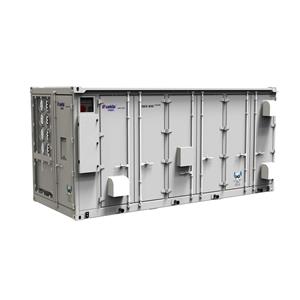Energy storage industry accelerates, technological innovation drives energy transition
With the acceleration of global energy transformation, the energy storage industry is ushering in
unprecedented development opportunities. Energy storage technology, as a key support for solving
the volatility of new energy and enhancing the flexibility and stability of the power system, is becoming
an important development direction in the energy field.

Energy storage technology ‘blossomed’, rapid market growth
In 2024, the global energy storage market continued to maintain a high rate of development, with the
installed capacity of newly commissioned power storage projects reaching 82.7 GW, a year-on-year
increase of 59.0%. Among them, the new energy storage installed capacity accounted for nearly 90%,
reaching 74.1 GW. China's performance in the field of new energy storage is particularly outstanding,
the new installed capacity reached 43.7 GW, accounting for about 60% of the global new installed
capacity. By the end of 2024, China's cumulative power storage installed capacity reached 137.9 GW,
of which the installed capacity of new energy storage reached 78.3 GW, for the first time exceeding the
installed capacity of traditional pumped storage.

In terms of technology, lithium-ion battery energy storage still dominates, but emerging technologies
such as compressed air energy storage, liquid flow battery energy storage, sodium-ion battery energy
storage, gravity energy storage and flywheel energy storage are also making breakthroughs. For example,
the new 8 MWh energy storage system launched by Vision Energy Storage can reduce the number of cells
by more than 30% and increase the capacity by about 60% compared with the mainstream products in the
market by improving the capacity of a single cell, and reduce the cost of electricity for the whole life cycle by about 40%.
AI-enabled energy storage, enhancing the level of intelligence
Against the backdrop of new energy's full market entry and AI-enabled industrial change, artificial intelligence
is deeply integrating with energy storage systems, reshaping core aspects such as battery management, energy
scheduling and power trading. For example, the world's first intelligent body energy storage EN 8 Pro released by
Vision Energy Storage is based on a large AI model, which promotes the autonomous and efficient interaction between
energy storage and the power market and power system. The intelligent energy storage management platform ‘Tianheng
Smart Storage’ released by Ningde Times, through the innovative collection of ‘big data platform + AI big model and advanced
mechanism algorithm fusion + AI assistant tool’, builds a comprehensive system for energy storage power stations covering intelligent
early warning, operation analysis, power station checkup and intelligent operation and maintenance. It builds a full set of standardised
capabilities for energy storage power stations, including intelligent early warning, operation analysis, power station physical examination
and intelligent operation and maintenance.
Policy support promotes high-quality development of energy storage industry
On February 17, 2025, the Ministry of Industry and Information Technology and other eight departments jointly issued and
implemented the Action Plan for the High-Quality Development of the New Energy Storage Manufacturing Industry, which
supports the research and development of the whole industrial chain's energy consumption measurement, carbon emission
accounting and evaluation specifications, the research and establishment of the ‘passport’ system for energy storage batteries,
and the accelerated construction of a new traceability management system and carbon footprint certification system for new energy
storage products. footprint certification system. In addition, many places have introduced special subsidy policies to promote the
widespread application of energy storage technology.
Challenges and opportunities for the energy storage industry
Although the energy storage industry has a bright future, it is also facing many challenges. On the one hand, market competition has
intensified, and the price war has entered a white-hot stage. On the other hand, the energy storage industry also faces the pain point
of inaccurate positioning of critical faults, which brings more anxiety to customers and makes fault analysis and troubleshooting more
difficult. In addition, with the cancellation of the mandatory distribution of storage policy, the industrial and commercial energy storage
market competition has become more intense, and enterprises need to continuously improve their technical level and market
competitiveness.

Future Outlook
In the future, the energy storage industry will continue to maintain a rapid growth trend. With the continuous progress of
technology and cost reduction, energy storage systems will be applied in more fields. For example, zero-carbon parks will
become the new battleground for the energy storage industry, promoting the integration of energy storage systems and thediversification of business models. In addition, energy storage companies will also accelerate the expansion of overseas markets
to increase global market share.
In conclusion, energy storage industry, as the core support of energy transformation, is ushering in unprecedented
development opportunities.



